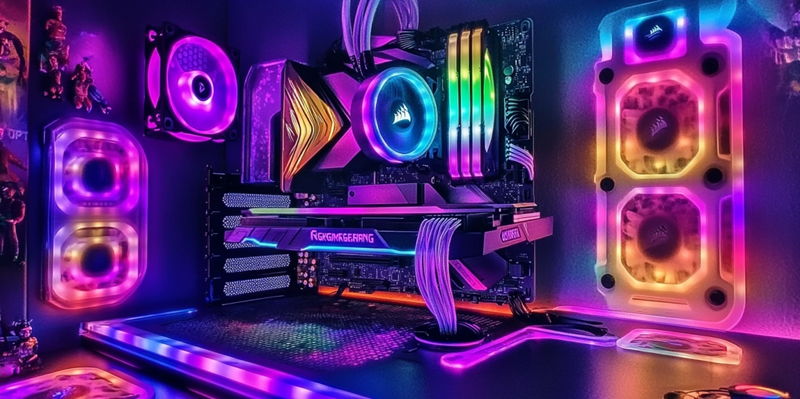Colorful recently unveiled its iGame Neptune PC, an eye-catching prebuilt computer from China characterized by its open-frame chassis and pre-installed liquid cooling system, which is set to enter production in December. This meticulously engineered design features handles for portability and a unique concealed liquid cooling channel exclusively for the CPU, combining both aesthetic flair and functional prowess. The company’s decision to expand its iGame Neptune components into a complete PC underscores a strong emphasis on advanced cooling techniques for both the CPU and GPU, hinting at superior thermal performance.
Diving into the specifics, the iGame Neptune employs Nvidia’s 40-series GPU, which is kept cool by a robust 360mm all-in-one cooler. While the GPU’s cooling is prominently showcased, the mechanism for cooling the CPU remains hidden, adding an air of mystery to its design. However, despite these impressive liquid cooling solutions, the system relies on older hardware, including the Intel Z790 motherboard and what is presumably a Core i9-14900K CPU. The release of Intel’s Arrow Lake CPUs and the Z890 chipset is just around the corner, rendering these components outdated. Additionally, Nvidia’s upcoming 50-series GPUs will soon overshadow the 40-series GPU featured in the Neptune, raising questions about the long-term value of the system.
Colorful’s focus on liquid cooling extends to cooling the RAM, motherboard, and SSD through passive air circulation and a large heatsink. This sophisticated cooling infrastructure points to a well-thought-out design aimed at maintaining optimal performance under high loads. However, the impending obsolescence of the key hardware elements can significantly diminish its appeal for consumers seeking longevity and future-proofing. The CNC-machined aluminum frame of the iGame Neptune, which doubles as a giant heatsink, is one of its standout features. This design choice enhances heat dissipation capabilities, yet its reliance on soon-to-be-superseded technology raises doubts about its relevance in the fast-evolving tech landscape.
A Glimpse into the Future
Colorful recently introduced its iGame Neptune PC, a striking prebuilt computer from China known for its open-frame chassis and pre-installed liquid cooling system. Expected to enter production in December, this carefully designed PC includes handles for easy transport and a unique hidden liquid cooling channel for the CPU, merging visual appeal with practical functionality. The company’s move to offer a complete iGame Neptune PC highlights a focus on advanced cooling methods for both the CPU and GPU, signaling superior thermal performance.
Delving deeper, the iGame Neptune utilizes Nvidia’s 40-series GPU, kept cool by a robust 360mm all-in-one cooler. While the GPU’s cooling solution is clearly visible, the CPU cooling remains concealed, adding a layer of intrigue. Despite impressive cooling, the system uses older hardware, featuring an Intel Z790 motherboard and likely a Core i9-14900K CPU. With Intel’s Arrow Lake CPUs and Z890 chipset on the horizon, these components may soon be outdated. Also, Nvidia’s forthcoming 50-series GPUs could soon eclipse the included 40-series model, questioning the system’s long-term value.
Colorful’s devotion to liquid cooling extends to cooling the RAM, motherboard, and SSD via passive air circulation and a sizable heatsink. This sophisticated setup shows a design aimed at sustaining peak performance under heavy demands. However, the looming obsolescence of crucial hardware parts might lessen its appeal for those aiming for longevity and future-proofing. The iGame Neptune’s CNC-machined aluminum frame, doubling as a massive heatsink, is another standout feature. While this design improves heat dissipation, relying on soon-to-be outdated technology casts doubt on its relevance in the rapidly evolving tech world.

